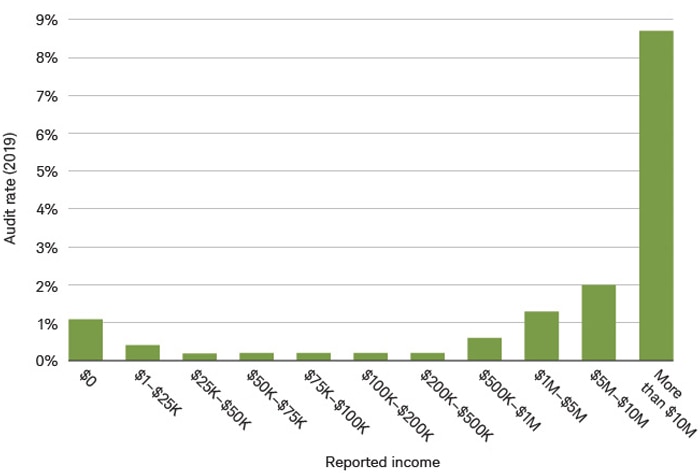"Your federal tax return has been selected for examination." Few pieces of correspondence evoke as much anxiety as an audit notice from the IRS. After all, not only can audits be extremely time-consuming, but they often result in interest, additional taxes, and even penalties.
Congress recently earmarked more than $45 billion specifically for tax enforcement to help remedy a decade-long decrease in audit rates. As a result, taxpayers who historically have been flagged for examination—business owners, the self-employed, and the wealthy—may find themselves under greater review than in recent years.
More money, more scrutiny
In 2019, taxpayers with more than $10 million in income were roughly six-and-a-half times as likely to be audited as those in the $1 million to $5 million range.

Source: IRS.
For illustrative purposes only.
"Unfortunately, the tax returns of the affluent are generally more complex—and therefore more likely to contain red flags," says Hayden Adams, CPA, CFP®, director of tax and wealth management at the Schwab Center for Financial Research, who previously worked for eight years as an IRS senior auditor. "Fortunately, those flags are well known, making them easier to avoid."
Here, Hayden identifies five of the IRS' top triggers.
1. Missing income
Taxes on income derived from regular wages are automatically withheld and reported by one's employer. However, taxes aren't normally withheld from nonwage income—including business income, capital gains, dividends, interest, rental income, and royalties—making it more prone to discrepancies and examination by the IRS.
What to do
"Your financial firm will send 1099 forms for capital gains, dividends, and interest, which must be accurately accounted for on your return," Hayden says. "For income that doesn't pass through an intermediary, such as business or rental income, you're required to document and report it yourself." Underreported income is often due to a missing or out-of-date 1099, inaccurate accounting practices, or both. "Whatever your sources of income, you need to ensure your return reflects them all," Hayden says.
Don't miss a dollar
Here are all the forms required to accurately report your income to the IRS.
| Source of income | Form | Source of form | Generally due by |
|---|---|---|---|
| Dividends | 1099-DIV | Investment broker | January 31 |
| Interest | 1099-INT | Bank and/or investment broker | January 31 |
| Regular wages | W-2 | Employer | January 31 |
| Social Security | SSA-1099 | Social Security Administration | January 31 |
| Distributions from annuities, pensions, and/or retirement savings accounts | 1099-R | Insurance company, pension sponsor, and/or investment broker | January 31 |
| Miscellaneous income, such as rents and royalties | 1099-MISC | Various agencies and businesses | February 1 |
| Independent contractor income | 1099-NEC | Hiring agency/business | February 1 |
| Proceeds from a real estate sale | 1099-S | Title company | February 15 |
| Sale of securities | 1099-B | Investment broker | February 15 |
| Income from partnership interests (including some ETFs that invest in commodities) | Schedule K-1 | Investment broker | March 15 |
2. Large swings in income
Individuals whose income fluctuates significantly from one year to the next can also find themselves in the IRS' sights. This can be the case for those who are self-employed or own a company. "Big changes in income are a huge red flag for the IRS because they sometimes signal underreported income, either in the current year or in previous years," Hayden says.
What to do
Consider including notes or an explanation with your tax filing if there are big changes in your expenses or income from year to year. "For example, if your business's income plunged because you lost a large account, you'll want the IRS to take that into consideration when determining whether an audit is warranted," Hayden says. If you file electronically, most tax software allows you to add supplemental documentation and schedules to help explain your situation.
3. Business losses
Turning a profit can be challenging for any business, especially those just getting off the ground. However, the IRS will take notice if you claim losses year after year or if a loss is substantial. "You're less likely to be audited in the first few years, when losses are normal and expected," Hayden says. "Over the longer term, though, businesses are supposed to make money—and if yours doesn't, the IRS will want to know why."
What to do
Keep careful records for at least seven years that detail every dollar coming into and going out of your business. "What's more, if your business is a sole proprietorship, the IRS may question whether it's more of a hobby—in which case the loss may not be deductible," Hayden says.
4. Questionable deductions
While your deductions may be well founded, some may nevertheless trigger a second look by the IRS. In particular, be mindful of:
- Outsized charitable donations: The IRS flags charitable deductions that far exceed the average donation of those at a similar income level. Be aware, too, that such deductions are capped to 60% of your adjusted gross income (AGI) for cash donations and 30% of AGI for stocks and other property.
- Passive losses on a rental property: If the costs to operate a property exceed the rental income it generates, you may not be able to claim a loss—unless:
- You own at least 10% of the property, you're personally involved in managing it, and your modified adjusted gross income is less than $100,000—or:
- You're a qualified real estate professional (meaning you spend at least 750 hours annually on such work and it accounts for more than 50% of your annual working hours) and you take an active role in the management of the property.
- Unqualified home-office deductions: Unless you're self-employed and conduct the majority of your business from your home, you cannot deduct any home-office expenses. "With so many people now working from home, taxpayers may assume they qualify for this deduction," Hayden says. "Unfortunately, regular employees don't qualify, even if they pay out of pocket for all or part of their home-office setup."
What to do
Have supporting documentation for any deduction on your tax return, especially those that are significant or subject to special rules, such as rental losses. "You can't always avoid an audit," Hayden says, "but thorough records that support your deductions can quickly appease most auditors."
5. Undervalued assets
Estate tax returns tend to be audited at a higher rate than individual returns. In 2019, for example, the IRS audited 1.4% of estate tax filings, compared with just 0.2% of individual filings. The biggest reason? Undervalued assets. "The IRS has seasoned valuation experts, and if they think the estate has valued its assets too low, an audit could be just around the corner," Hayden says.
What to do
When valuing assets with no public market price—such as real estate, art, or a closely held business—executors of large estates should average the estimates from two or three qualified appraisers. "Should the valuations come into question, having multiple appraisals can help substantiate your position," Hayden says.
The buck stops with you
Even if you hire a professional to prepare your taxes, the accuracy of your filing ultimately falls on your shoulders. "I can't tell you how many people just sign their professionally prepared tax returns and never even look at them," Hayden says.
Going through these steps may help reduce the likelihood of an audit, but if one is unavoidable, it also can help ensure your tax return stands up to scrutiny. "If you followed the rules, retain good documentation, and have a trusted tax advisor to represent you, the process can actually go quite smoothly," Hayden says.
A tale of three audits
For every type of audit, the IRS will provide in advance a written request for the specific documents it wants to see.
" id="body_disclosure--media_disclosure--99376" >The IRS has three main types of audit—some being more painful than others.
- Correspondence audit: The most common IRS audit, this typically is conducted by mail and sent for reasons such as missing information, small balances owed, or identity verification. (Note: Be aware that scammers have been sending fraudulent letters to collect funds from unsuspecting taxpayers. Identifying fakes isn't always easy, but typical red flags include demand for immediate payment, threats of jail time, and grammatical errors and misspellings. You can contact the IRS at 800-829-1040 or visit irs.gov to confirm a letter's legitimacy or report an incident.)
- Office audit: In this type of audit, taxpayers receive a written summons to go to an IRS office to meet with an agent. This generally happens with more complex tax returns or if the return has multiple items being questioned.
- Field audit: The most comprehensive type of audit, this in-person meeting typically occurs at the taxpayer's business or home to conduct a thorough examination of the return in question. These audits can often last several weeks or even months, depending on the issues being reviewed and the complexity of the tax return.
For every type of audit, the IRS will provide in advance a written request for the specific documents it wants to see.
The information provided here is for general informational purposes only and should not be considered an individualized recommendation or personalized investment advice. The investment strategies mentioned here may not be suitable for everyone. Each investor needs to review an investment strategy for his or her own particular situation before making any investment decision.
All expressions of opinion are subject to change without notice in reaction to shifting market conditions. Data contained herein from third-party providers is obtained from what are considered reliable sources. However, its accuracy, completeness, or reliability cannot be guaranteed.
Examples provided are for illustrative purposes only and not intended to be reflective of results you can expect to achieve.
This information does not constitute and is not intended to be a substitute for specific individualized tax, legal, or investment planning advice. Where specific advice is necessary or appropriate, Schwab recommends consultation with a qualified tax advisor, CPA, financial planner, or investment manager.
0323-294F

